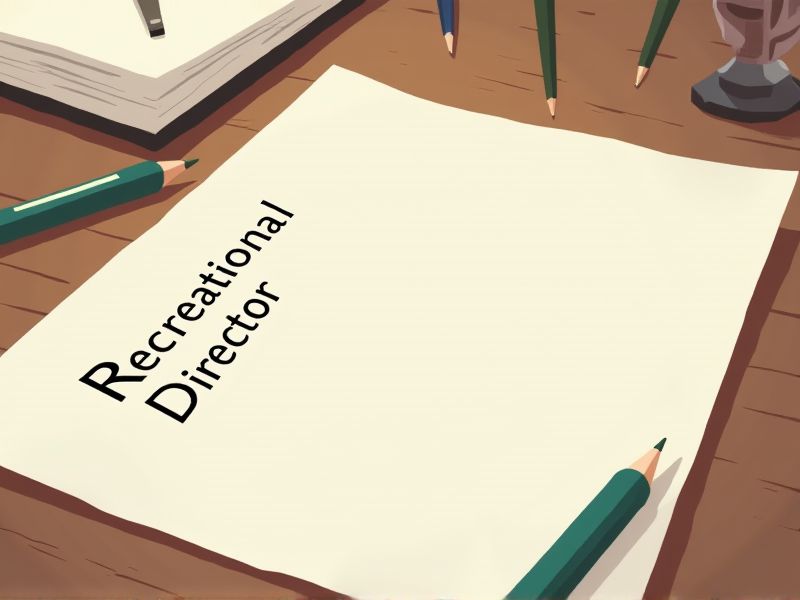
Recreational Directors oversee diverse activities, requiring a deep understanding of both management and recreation principles. Certifications ensure they possess the necessary skills to design programs that cater to various populations while promoting safety and inclusivity. Such qualifications also enhance their ability to effectively lead teams and manage resources efficiently. Here are some important certifications you may need for a Recreational Director role.
Certified Parks and Recreation Professional (CPRP)
Obtaining the Certified Parks and Recreation Professional (CPRP) credential ensures that a Recreational Director possesses a standardized level of knowledge and expertise. This certification enhances the ability to effectively manage resources, improve community programs, and address safety concerns. Employers often view CPRP as an indicator of commitment to professional growth and quality service delivery. In communities, having a certified director may bolster trust and support for recreational initiatives and projects.
Certified Therapeutic Recreation Specialist (CTRS)
Recreational Directors benefit from having a Certified Therapeutic Recreation Specialist (CTRS) because the certification ensures specialized knowledge in therapeutic methods essential for diverse community needs. This expertise enhances program effectiveness, particularly in aiding individuals with disabilities or specific health conditions through targeted recreational activities. The CTRS credential also supports compliance with healthcare standards and regulations, reinforcing the credibility and safety of recreational programs. Moreover, a CTRS brings a deeper understanding of patient assessments and personalized intervention strategies, optimizing outcomes and participant satisfaction.
CPR/First Aid/AED Certification
A Recreational Director often supervises environments where participants engage in physical activities, leading to potential health emergencies that require immediate response. CPR/First Aid/AED certification equips them with the skills to manage these emergencies effectively, enhancing participant safety. Having certified staff can reduce liability for the organization, as it demonstrates a commitment to providing a safe environment. This certification also improves the Director's ability to train and oversee their team in emergency protocols.
Aquatic Facility Operator Certification
Recreational Directors often oversee pools and aquatic facilities, requiring them to ensure the safety and proper maintenance of these spaces. An Aquatic Facility Operator Certification equips them with the knowledge to manage water quality and facility operations effectively. Accidents and health risks can occur if water quality and facility standards are not properly maintained. Certification also instills confidence in patrons, knowing their safety is managed by trained and knowledgeable staff.
American Heart Association Basic Life Support (BLS) Certification
The American Heart Association Basic Life Support (BLS) Certification equips a Recreational Director with critical skills to handle medical emergencies. Recreation activities often involve physical exertion, increasing the likelihood of events like cardiac arrest, where BLS training proves vital. Having certified staff can enhance participant trust and ensure prompt, effective response during emergencies. Many facilities and employers list BLS certification as a requirement to ensure safety standards are met.
National Youth Sports Coordinator Certification
The National Youth Sports Coordinator Certification equips recreational directors with specialized knowledge in child development and sports safety, enhancing program quality. The certification fosters trust among parents and participants, encouraging higher enrollment and engagement in youth sports programs. This certification ensures directors stay updated on best practices and evolving standards in youth sports management. Implementing certified coordinators can reduce incidents, ensuring safer and more inclusive recreational environments.
Event and Program Planning Certification
A Recreational Director equipped with an Event and Program Planning Certification gains enhanced skills in organizing and executing diverse activities, which leads to improved community engagement and satisfaction. Efficient planning reduces the likelihood of logistical issues and budget overruns, fostering trust and reliability. Certification provides standardized knowledge that aligns with industry best practices, ensuring quality and consistency in programs. Possessing formal training increases a director's credibility, which often results in greater opportunities for collaboration and funding.
Nonprofit Management Certification
Nonprofit Management Certification equips a Recreational Director with essential skills in fundraising and budget management, which are crucial for sustaining nonprofit programs. Knowledge gained from the certification enhances strategic planning abilities, ensuring programs meet community needs efficiently. The training also covers volunteer management, vital for leveraging community resources and support. Understanding compliance and regulatory requirements through certification minimizes legal risks and promotes ethical standards within nonprofit operations.
Community Recreation Program Planning Certification
Community Recreation Program Planning Certification equips Recreational Directors with essential skills in strategic planning that improve program effectiveness. Certification ensures that directors understand compliance with local and national regulations, reducing the risk of legal issues. It enhances directors' ability to implement inclusive and diverse programs, catering to various community needs. This certification often leads to improved program funding opportunities as stakeholders view certified professionals as more credible.
Grant Writing Certification
Grant writing certification enhances a Recreational Director's ability to secure funding for community programs, leading to more diverse and robust recreational offerings. Proficiency in grant writing often results in increased success rates for grant applications, providing necessary financial resources for facility upgrades and new projects. Having a certification validates the director's competency, instilling confidence in stakeholders and potential funders. As competition for grant funds intensifies, certified skills differentiate candidates, positioning them more favorably for securing necessary resources.
Summary
By obtaining certifications, you can enhance your expertise and qualifications as a Recreational Director. This advancement often leads to increased credibility, making you more appealing to potential employers. You might experience improvements in program quality and participant satisfaction due to your refined skills. These factors can contribute to career growth and potentially result in higher compensation.
